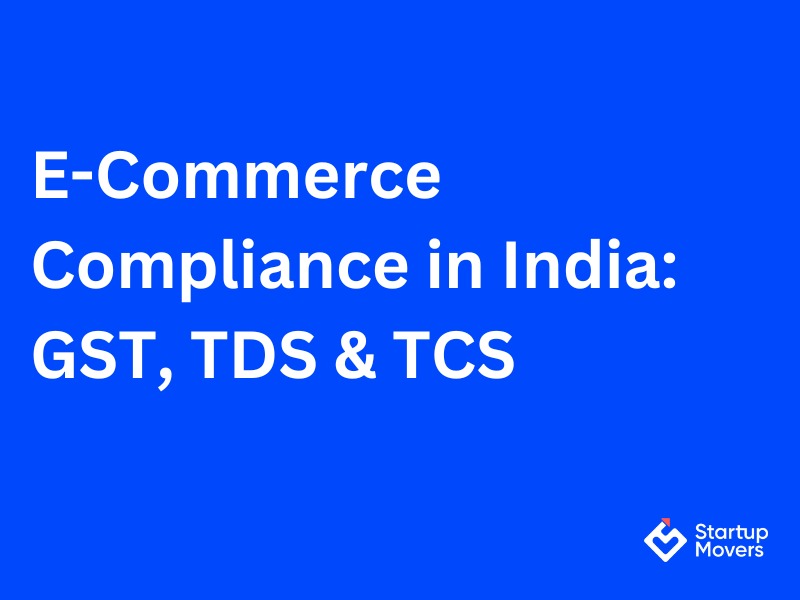Why Trademark Registration is Crucial for Your Startup's Growth




E-commerce compliance in India is essential, especially with the complexities of GST, TDS, and TCS. This blog breaks down the key regulations you need to follow to ensure your business remains compliant with these crucial tax laws. Dive in to safeguard your e-commerce operations today!
e-commerce has been defined in the u/s. 2(44) of CGST Act, 2017. Short for electronic commerce, it involves buying and selling goods or services online.
It’s the process of conducting transactions over the internet, whether you're buying a product, subscribing to a service, or downloading digital content. The convenience of shopping from anywhere, anytime, has fueled the rapid growth of e-commerce in India.
In India, e-Commerce businesses operate on two distinct models:
In the first model, the supplier sells goods or services directly through their own website. There’s no third party involved, just a simple transaction between buyer and seller. For example, a brand like Fabindia sells products directly through its own online store. GST laws apply as they would for any regular sale.
The second model involves a third-party e-Commerce operator (ECO), known as a marketplace or aggregator. This operator connects buyers and sellers, providing a platform for transactions. For example, if Fabindia sells its products on Amazon, Amazon acts as the operator, linking customers with the seller. In this blog, we will dive into compliances under this model.
An E-commerce Operator is defined under Section 2(45) of the CGST Act, 2017. It refers to any person or entity that owns, operates, or manages a digital platform where e-commerce activities occur.
This could be a platform like Amazon or Flipkart or even a small business managing its online store. Essentially, if you facilitate buying and selling online, you are an e-commerce operator.
In the e-commerce ecosystem, a buyer is the consumer who purchases goods or services online. Buyers benefit from shopping at home, choosing from a wide range of products, and often finding better deal/ s than in stores.
A seller is the individual or business offering products or services for sale on an e-commerce platform. Sellers range from large corporations to small businesses and even individual entrepreneurs.
They rely on e-commerce platforms to reach a broader audience and increase sales without needing a physical storefront.
As per Section 24(x) of the CGST Act, 2017, every ecommerce operator is liable for GST registration irrespective of their turnover.
For sellers who supply goods through e-commerce platforms, GST registration is mandatory, irrespective of their turnover. This requirement is outlined in Section 24(ix) of the CGST Act, 2017. Sellers are obligated to register for GST, even if their sales are minimal, ensuring that all transactions on e-commerce platforms are accounted for under the tax regime.
However, there are specific exemptions for service providers. The Central Government, through Notification No. 65/2017-C.T., dated 15-11-2017, exempted certain service providers from mandatory GST registration. Service providers with an annual turnover not exceeding ₹20 lakh (10 lakh in specific states), who are not covered under Section 9(5) of the CGST Act, do not need to register for GST.
Important Note: An e-commerce operator must register under GST in every state where it supplies goods or services.
Section 9(5) of the CGST ActSection 9(5) pertains to certain services where the e-commerce operator, rather than the service provider, is liable to pay GST. These services are:
|
In an e-commerce transaction, three main parties are involved: the supplier, the buyer, and the e-commerce operator. When it comes to GST, two distinct transactions are subject to tax:
Case I: GST on Sale of Goods/Services Between Buyer & Seller
The first transaction is straightforward. The supplier provides goods or services to the buyer, and GST is charged on this sale (except cases covered u/s 9(5) of GST Act). The buyer pays the GST along with the purchase price, and the supplier remits this tax to the government.
Case II: GST on Commission Charged by ECO
The second transaction involves the e-commerce operator. The operator charges a commission to the supplier for using the platform. GST is also applicable on this commission. The supplier pays this GST to the e-commerce operator, who then remits it to the government.
|
This commission is categorised under support services. These services fall under Tariff heading 9985, ‘Support Services,’ and attract GST at 18%. |
Get your business GST-ready with our expert assistance—fast, easy, and compliant.
Book Your FREE GST ConsultationAccording to the provision of Section 52 of CGST Act, TCS, or Tax Collected at Source, is a tax collected by e-commerce operators. It’s deducted from the amount they receive on behalf of sellers who make sales through their platform.
Let’s look at some important consideration for TCS for e-Commerce transactions:
Let’s now cover various TDS compliances relevant for e-Commerce transactions.
Deducted by: e-Commerce Operator (ECO)
Under section 194O of the Income Tax Act, e-commerce operators (ECO) must deduct TDS at a rate of 1% (0.1% w.e.f. October 1, 2024) on gross amount of sales or services made by seller on their platform. TDS is deducted from the payment made to sellers, whether for goods, services, or both.
Exemptions:
|
Higher TDS Rate If a seller fails to provide their KYC documents, such as a PAN card and an Aadhaar card, the TDS rate increases to 5%. This higher rate applies regardless of the gross amount of the transaction. |
Deducted by: Seller
Under section 194H of Income Tax Act, any person (excluding individuals or HUF) making paying commission to a resident should deduct TDS at the rate of 5% (2% w.e.f. October 1, 2024). This implies that ecommerce sellers are required to deduct TDS while making payment of commission to the e-Commerce operators (ECO).
Exemption: If the commission paid to the eCommerce Operator in a financial year is less than ₹ 15,000, no TDS shall be deducted.
|
Starting from FY 2020-21, individuals and HUFs with business turnover over ₹1 crore or professional receipts exceeding ₹50 lakh must also deduct TDS. |
Deducted by: Seller
e-Commerce platforms like Amazon and Flipkart not just behave as aggregators between buyers and sellers of goods and services, but also as powerful advertisement platforms. Under section 194C of Income Tax Act, a seller is required to deduct TDS at the rate of 2% on advertisement charges paid to the e-Commerce operator (ECO).
Exemption:
|
20% TDS shall be levied in case the e-Commerce operator fails to furnish his PAN. |
Amount Received by Seller From e-Commerce Operator (ECO)After taking into consideration above transactions and some more, the final amount payable to seller by ECO is:
|
Staying compliant with e-commerce tax laws in India is crucial for smooth operations and building trust. From GST to TDS and TCS, understanding these regulations ensures your business thrives in a dynamic market.
Ensure your business is always compliant with the latest GST, TDS, and TCS regulations
Get on a 1:1 call with us!
